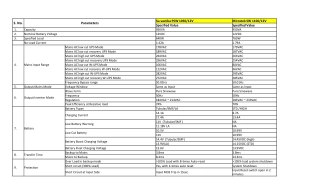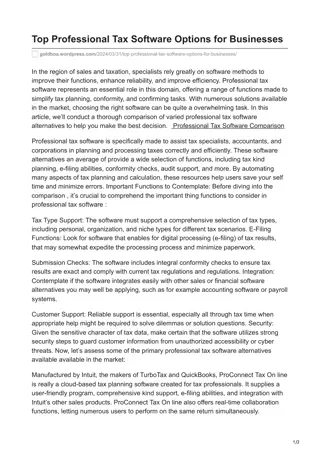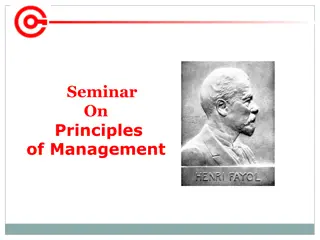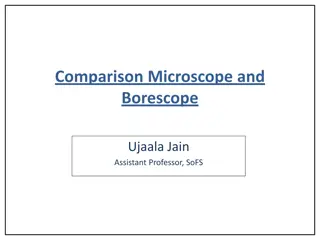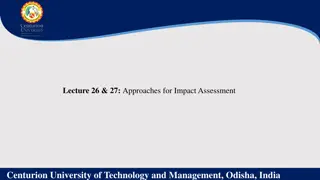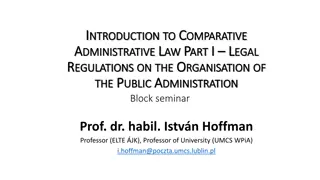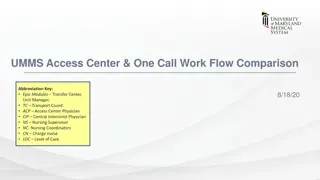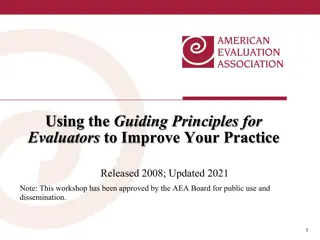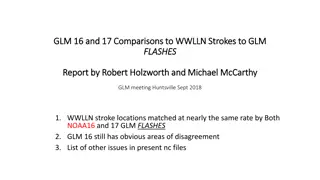Inverter Specifications and Transformer Types Comparison
Detailed comparison of Su-vastika PSW 1050/12V and Microtek SW 1100/12V inverters, highlighting load capacity, efficiency, battery types, protection features, and notable differences. Discusses the implications of high power draw on inverter performance, MOSFET types, noise levels, overload protecti
1 views • 5 slides
Principles of the Ghana Civil Service Code of Conduct
The Code of Conduct for the Ghana Civil Service, outlined by Elizabeth Obeng-Yeboah, emphasizes principles such as abiding by the constitution and laws with dignity, integrity, and professionalism. It sets standards for conduct, avoiding conflicts of interest, maintaining political neutrality, and u
1 views • 34 slides
Understanding Bayesian Model Comparison in Neuroimaging Research
Exploring the process of testing hypotheses using Statistical Parametric Mapping (SPM) and Dynamic Causal Modeling (DCM) in neuroimaging research. The journey from hypothesis formulation to Bayesian model comparison, emphasizing the importance of structured steps and empirical science for successful
4 views • 36 slides
Forensic Analysis Instruments: Microscope vs. Borescope
Instruments like the stereomicroscope, comparison microscope, and borescope are used in forensic analysis for individual examination, side-by-side comparison, superimposition, and barrel analysis. The comparison microscope is utilized for analyzing fired cartridge cases, while the borescope helps in
0 views • 8 slides
Academic Freedom and Shared Governance in Higher Education
Academic Freedom and Shared Governance are foundational principles advocated by the American Association of University Professors (AAUP) to ensure educators have the freedom to explore, research, teach, and discuss without censorship. These principles empower educators to enhance student learning an
0 views • 9 slides
Essential Principles of Management Discussed in Seminar
Explore the foundational principles of management discussed in a seminar on principles of management. Delve into topics such as division of work, authority, discipline, unity of command, and unity of direction as outlined by Henri Fayol. Gain insights into the importance of these principles for effe
0 views • 22 slides
Comparison Microscope and Borescope
Instruments like Stereomicroscope, Comparison Microscope, and Borescope are used for individual examination, side-by-side comparison, superimposition, and analysis of barrels in forensic investigations. Comparison microscopes are used for examining fired cartridge cases but have limitations such as
1 views • 8 slides
Comparison of Government Systems: Unitary, Confederation, and Federal
The comparison of unitary, confederation, and federal government systems highlights how power is distributed between central and local authorities. In a unitary system, the central government holds most power, while local governments have limited autonomy. In confederation, local governments retain
0 views • 37 slides
Comparison of Doxycycline plus Ivermectin versus Ivermectin Alone in Onchocerciasis Treatment
Onchocerciasis treatment comparison between doxycycline plus ivermectin and ivermectin alone revealed uncertain effectiveness. While the combined treatment may show potential benefits in adult female sterilization, effects on vision-related outcomes remain unclear.
0 views • 9 slides
Approaches for Impact Assessment at Centurion University, India
Various approaches for impact assessment include Experimental Design, Quasi-Experimental Design, Before-After Comparison, Counterfactual Analysis, Cost-Benefit Analysis, Qualitative Methods, and Mixed Methods. These methods help evaluate the effectiveness and efficiency of interventions by measuring
0 views • 4 slides
Exploring Figurative Language: Hyperbole, Simile, Metaphor, Personification, Idiom, and Pun
Delve into the world of figurative language with examples of hyperbole, simile, metaphor, personification, idiom, and pun. Understand the art of exaggeration in hyperbole, the comparison of two objects in simile, the direct comparison in metaphor, giving human qualities to non-human entities in pers
1 views • 22 slides
General Characters and Comparison of Cyclostomata: Petromyzon vs. Myxine
Cyclostomata, a group of jawless vertebrates, comprises hagfishes and lampreys, exhibiting unique characteristics such as cylindrical body, lack of pair fins, smooth skin, and presence of mucous glands. They possess specific features like circular mouth with teeth, lateral line sense organ, and two-
0 views • 8 slides
International Law of War: Nuremberg Principles and Accountability
The Nuremberg Principles, derived from the trials of Nazi officials for war crimes, establish accountability in international law. These principles hold individuals responsible for committing acts considered crimes under international law, regardless of their position or orders received. The assumpt
2 views • 22 slides
Comparative Analysis of Administrative Law Regulations in Public Administration
This block seminar delves into the realm of administrative law regulations, exploring topics such as the concept of Love Law, different legal approaches, pluralism in Roman law, modern pluralism, challenges of comparison, levels of comparison, and methods of legal comparison. The discussion includes
2 views • 83 slides
Cultural Identity and Poetry Comparison
Exploring the themes of cultural identity and displacement through poetry comparison, focusing on "The Blessing" and "Presents From My Aunts in Pakistan." The analysis delves into similarities and differences in how the poets portray their cultural experiences and attitudes, emphasizing the impact o
0 views • 7 slides
Understanding Degrees of Comparison in English Grammar
Degrees of comparison in English grammar refer to the different forms of adjectives and adverbs used to indicate the level of comparison between different qualities. This includes the positive degree for basic descriptions, the comparative degree for comparing two things, and the superlative degree
0 views • 17 slides
Promoting Ethical Principles in Social Science Research
Explore the challenges and strategies for translating and applying ethical principles, especially in emergency contexts. Learn key questions in social science research and how to ensure information contributes to community actions. Understand the importance of considering ethical principles in all w
0 views • 21 slides
Reflections on Simple Pleasures, Humility, and Scenarios of Comparison
Explore the themes of embracing simple pleasures, understanding true humility, and navigating challenging scenarios of comparison and humility in daily life. Drawing insights from spiritual teachings and personal reflection, discover ways to find joy in both personal achievements and the accomplishm
2 views • 8 slides
UMMS Access Center One-Call Workflow Comparison
UMMS Access Center and One-Call Workflow Comparison detailing the process for transferring patients to and from UMMS hospitals, involving various healthcare professionals such as Critical Care Transfer Coordinators, nurses, and providers. The workflow includes steps for initiating consultations, arr
0 views • 5 slides
Design of Experiment in Animal Genetics & Breeding: Principles and Methods
Biostatistics and computer applications play a key role in the design of experiments in animal genetics and breeding. Proper allotment of treatments to experimental units is crucial to study treatment effects accurately. Designing experiments helps in maximizing information from available resources,
0 views • 37 slides
Study Guide for Principles of Management Course at Africa Research University (ARU)
Welcome to Africa Research University (ARU)! This study guide is designed to help you navigate through the Principles of Management course (Course Code: PRM4) at ARU. It provides an introduction to the course content, emphasizing the importance of developing management skills to effectively lead and
1 views • 40 slides
Key Principles of Insurance Explained with Visuals
Understanding the principles of insurance is crucial for both insurance seekers and companies. The principles include Utmost Good Faith, Insurable Interest, Indemnity, Contribution, and Subrogation. These principles ensure transparency, fairness, and protection for policyholders. Visual representati
0 views • 6 slides
Yearly Sales Comparison Report Presentation
Utilize the Yearly Sales Comparison Report Template in Excel to input data for generating charts and graphs. Capture screenshots of each element to construct your comprehensive Yearly Sales Comparison Report Presentation, including comparisons between current year and previous year sales data for 20
7 views • 6 slides
A Comparison of ELI and UNIDROIT Principles on Digital Assets
A comparison between the principles of Electronic Liability Initiative (ELI) and the International Institute for the Unification of Private Law (UNIDROIT) regarding digital assets. ELI focuses on security over digital assets, while UNIDROIT covers a broader range, including transfers, custody, and m
0 views • 5 slides
Principles of Training: Overload, Specificity, and Progression
Principles of training encompass overload, specificity, and progression. Overload requires doing more than usual, specificity involves tailored activities, and progression ensures gradual advancement. These principles are vital for improving fitness levels safely and effectively, emphasizing the nee
8 views • 17 slides
Comparison Between Takaful and Conventional Insurance: A Detailed Overview
Conventional insurance and Takaful are compared based on principles, practices, and alignment with Shariah law. This comparison examines concepts like pooling resources, Gharar presence, Maisir in insurance, Riba practices, and more. Insights from Joof Momodou Musa at the Global Takaful & Re Takaful
0 views • 16 slides
Effective Partnership and Mutual Accountability in Nutrition Clusters
The content discusses the minimum commitments needed for participation in Nutrition Clusters, explains the Principles of Partnership, and explores how these principles can enhance coordination and accountability to affected populations. It emphasizes partner commitments, such as leadership, mainstre
0 views • 7 slides
Comparison of Kentucky Highway Fatality Rates Across Multiple States
Analysis reveals Kentucky's highway fatality rates in comparison to other states over the years 2005, 2013, 2014, and 2015. Data from the National Highway Traffic Safety Administration (NHTSA) shows variations in fatalities per 100 million vehicle miles traveled, positioning Kentucky among the state
0 views • 29 slides
Overview of Fundamental Principles of Space Law and Outer Space Treaties
The content discusses the fundamental principles of space law highlighted at the United Nations Space Law Conference 2020, focusing on key treaties such as the Outer Space Treaty of 1967 and associated rights, duties, and obligations of states in space exploration and use, including non-appropriatio
0 views • 16 slides
Overview of Directive Principles of State Policy in Indian Constitution
Directive Principles of State Policy (DPSP) in the Indian Constitution encompass social, economic, and political programs aimed at realizing ideals of justice, liberty, equality, and fraternity. They are non-justiciable but guide the state in legislative matters. Classified into Socialistic, Gandhia
0 views • 24 slides
Understanding FAIR Principles in Biomedical Research
The FAIR principles - Findable, Accessible, Interoperable, and Reusable - provide a framework for ensuring scientific data in biomedical research is managed and shared effectively. This informative session delves into the theory and practice of FAIR principles, emphasizing the importance of data qua
0 views • 28 slides
The FAIR Principles for Data Management and Stewardship
Embrace the FAIR principles - Findable, Accessible, Interoperable, Re-usable - for effective scientific data management and stewardship. Learn how annotations enhance data FAIRness and the key attributes of each principle. Dive into the high-level guiding principles that ensure data is globally uniq
0 views • 25 slides
Understanding the Guiding Principles for Evaluators
This content provides insights into the Guiding Principles for Evaluators, including their history, assumptions, and key principles such as Systematic Inquiry and Competence. The workshop aims to increase knowledge about ethical evaluation practices and stimulate discussions within the evaluation co
0 views • 22 slides
Guiding Principles for GETSI/INTEGRATE Webinar – Materials Development and Goals
The webinar presented by David Steer from the University of Akron focuses on guiding principles for material development in the context of GETSI/INTEGRATE modules. It outlines goals for the session, including discussing components of the guiding principles, examples of meeting those principles, and
0 views • 13 slides
Airfare Comparison for Business vs Personal Travel
Christine Fragapane, Travel Coordinator, presents a comparison of airfare costs for business and personal travel on June 5, 2017. The instructions detail how to select dates, times, and airports for both personal and business trips using Concur. The task involves creating PDF itineraries for both ty
0 views • 6 slides
Understanding Henri Fayol's 14 Principles of Management
Henri Fayol, the Father of Modern Management, introduced 14 Principles of Management in 1916, outlining essential guidelines for effective management. These principles cover areas such as division of work, authority and responsibility, discipline, unity of command, and unity of direction. By followi
0 views • 19 slides
Principles of Management: Understanding Henri Fayol's 14 Key Principles
Explore the foundational principles of management through the lens of Henri Fayol's 14 key principles, which offer valuable insights into managerial decision-making and organizational interactions. Delve into the history of Henri Fayol, his contributions to management theory, the concept of authorit
0 views • 14 slides
Legal Principles of Insurance
The legal principles of insurance include indemnity, insurable interest, subrogation, and utmost good faith. These principles ensure fair compensation, financial risk protection, and honesty in insurance contracts. Understanding these principles is crucial for both insurers and policyholders to navi
0 views • 18 slides
Comparison of GLM-16 and GLM-17 with WWLLN Strokes
The report by Robert Holzworth and Michael McCarthy discusses the comparison of GLM-16 and GLM-17 with WWLLN strokes, highlighting areas of agreement and disagreement. Methods for matching GLM and WWLLN events are explored, focusing on time and distance considerations. The analysis shows that NOAA-1
0 views • 16 slides
